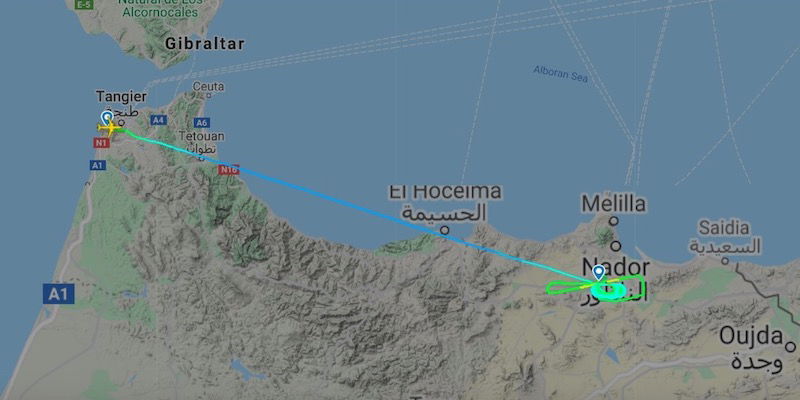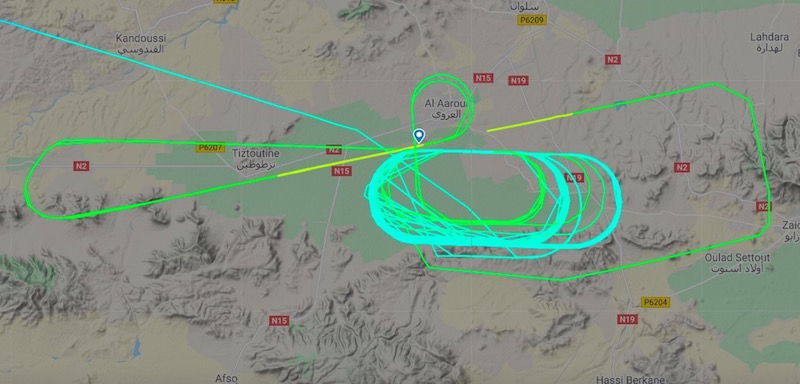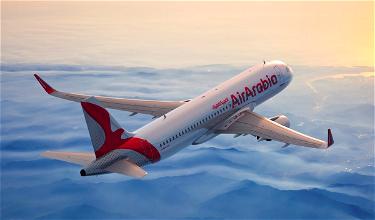It’s not unusual for a flight to enter a holding pattern due to congestion or weather, but I’ve never seen anything quite like this before.
An Air Arabia Maroc Airbus A320 operated a pretty incredible flight about a week ago. The 10-year-old Airbus A320 with the registration code CN-NMG was scheduled for a domestic flight within Morocco, from Tangier to Nador. This is a flight that covers a distance of 171 miles, so you’d ordinarily expect the flight time would be about 30 minutes in the air.
Well, unfortunately this flight dealt with some unfavorable conditions in a way I’ve never quite heard of before. The flight was initially supposed to depart at 9:35PM on November 2, but ended up being delayed until around 6AM the next day, allegedly due to weather conditions.
Sure enough, the next morning the plane took off shortly after 6AM. You’re probably thinking “great, so the plane landed in Nador at 6:30AM?” Not quite…
As you can see below, the plane entered a holding pattern on approach to Nador.

Not just any holding pattern, but a roughly four hour holding pattern, as it was only after 4hr35min in the air that the plane (finally) landed in Nador. Seriously, look at that flight path!

The plane ended up flying a total of 1,202 miles, over seven times the direct distance between the two airports.
You have to wonder if by the end of this flight passengers were disoriented from constantly turning in the same direction.
In the end passengers got to Nador around 13 hours after their scheduled departure time, including an eight hour overnight delay, and a 4.5+ hour flight. Driving would have only taken about half as much time.
Obviously we don’t fully know the circumstances here, and the plane ultimately landed safely, though I’m sure I’m not alone in being curious:
- Isn’t it a bit surprising the plane had enough fuel to circle for that long? I guess maybe it was fueled up for a few sectors that day, and they just burned through most of that on the flight…
- Was the weather looking better when the plane took off from Tangier, or what made them decide to actually take off?
- I’d be fascinated to know what discussions were taking place in the cockpit as the plane approached the destination, about diverting vs. continuing to circle
Bottom line
We’ve probably all found ourselves in a holding pattern on a flight at some point, though I’ve never heard of anything quite like the Air Arabia Maroc flight that circled for around four hours, covering a distance of around 1,000 miles.
Presumably bad weather was at play here, but this is still so fascinating…
What do you make of this unusual Air Arabia Maroc flight?
(Tip of the hat to Simple Flying)


@thenicePaul
Comparing Gibraltar with Ceuta and Melilla does nothing but show pure ignorance of both history and politics.
Ceuta and Melilla have never been “colonial” and their existence has nothing to do with imperialism. First of all, historically they were Spanish even before Spain (or Morocco for that matter) were political entities. They both became Spanish territories before the start of the 16th century, predating the Spanish empire by several decades. Even in the...
@thenicePaul
Comparing Gibraltar with Ceuta and Melilla does nothing but show pure ignorance of both history and politics.
Ceuta and Melilla have never been “colonial” and their existence has nothing to do with imperialism. First of all, historically they were Spanish even before Spain (or Morocco for that matter) were political entities. They both became Spanish territories before the start of the 16th century, predating the Spanish empire by several decades. Even in the 19th century when northern Morocco became a Spanish protectorate these cities had a different status. And in 1956 when the protectorate was returned to Morocco these cities weren’t included because they had never been a part of the protectorate, or colony in the first place.
Also, from a political standpoint both Ceuta and Melilla aren’t colonies nor resemble anything “colonial”. They’re an integral part of the Spanish state and have their own autonomous government, just as any other Spanish region. They don’t have any special economic status, besides the fact that there’s not VAT and their VAT-like tax goes directly to the autonomous government, instead of going through the central government like elsewhere in Spain. Gibraltar is a colony of the UK and it’s not an integral part of the UK. Spain’s grievances about Gibraltar have nothing to do with UK sovereignty but with the UK’s tendency to not respect the terms of the treaty (Utrecht) that bequeathed the rock to them on the first place. Gibraltar’s tax heaven status has drained the economic prospects of the Spanish towns surrounding it, taking resources without giving nothing in return. Ceuta and Melilla have helped develop economically the Moroccan towns that surround them.
Hence why comparing Gibraltar and Ceuta and Melilla is not only unfortunate but extremely oblivious
@Anas Gibraltar isn't part of the UK, that'll be one reason why.
why not just turn around instead of spending 4.5 hours in the air?!
And why is not Gibraltar shown as "UK"? Probably a conspiracy of the "Not Showing Borders of Shame"!
@derek
What knots you’re tying yourself in!
Surely all of us believe in democracy and self-determination? The question is not, therefore, how today do you construe the legalities of some centuries-old treaties, but what do the people themselves want?
In every single referendum, more than 95% of the people settled on the Falklands want to remain associated with the UK and not to be assimilated into Argentina. Frankly I couldn’t give a toss where...
@derek
What knots you’re tying yourself in!
Surely all of us believe in democracy and self-determination? The question is not, therefore, how today do you construe the legalities of some centuries-old treaties, but what do the people themselves want?
In every single referendum, more than 95% of the people settled on the Falklands want to remain associated with the UK and not to be assimilated into Argentina. Frankly I couldn’t give a toss where the sovereignty of the Falklands is located, but the will of the people affected is the most important thing, right?
There might be significant cultural differences at play here: the US fought a horrifically bloody civil war over, among other things, whether a state had a right to cede from the Union — deciding (wrongly, in my view, on that point, though I’m very happy with the end result for other reasons) that a state joining the Union was irrevocable.
That’s an imperialist view: states and countries are not (or shouldn’t be) bits of property, but are a manifestation of the democratic will of the people. If the Scots decide they no longer want to be part of the UK I shall be sad about them leaving but I will wish them a fond farewell.
The rest of the UK should have no say over whether or not the Scots remain — that would put the Scots into a form of imprisonment, akin to one party in a failed or even abusive marriage unable to get a divorce without the consent of the other.
For me, the same principles apply to all these post-Imperial places: for these purposes I’m not very interested in how they came into existence, but I am absolutely interested in what the people who live there want.
Derek, the indigenous groups of Australia (the oldest existing culture in the world) would like Australia back plus all artifacts stolen and held by British museums or perhaps compensation in lieu. Would you mind sorting that out as well?
Should have rebooked thru Accra on Global Ghana
Derek, I didn't say there aren't borders marked on the map. I simply noted that your claim that sovereign claims weren't noted by name applied to the whole map, not only Melilla.
@Ben Dover There ARE borders marked on the map. See the Moroccan Algerian border just east of Saidia, Morocco.
To those who ask for my opinion, I support the British claim of Gibraltar, South Sandwich Islands, and South Georgia over Spanish and Argentine claims, respectively. However, I am probably very unpopular in that I view the British claim of the Malvinas as disputed. There is evidence of a valid British claim but also there appears to be some validity to the Argentine claim. That does not mean that I think that the Argentine claim...
To those who ask for my opinion, I support the British claim of Gibraltar, South Sandwich Islands, and South Georgia over Spanish and Argentine claims, respectively. However, I am probably very unpopular in that I view the British claim of the Malvinas as disputed. There is evidence of a valid British claim but also there appears to be some validity to the Argentine claim. That does not mean that I think that the Argentine claim is stronger, just not adjudicated. This probably makes me unpopular among the British, Argentines, and Spanish.
Morocco has an interesting claim. They accept Spanish administration but want Melilla back if the Spanish get Gibraltar.
Melilla is a wonderful place. My experiences in Nador was not too memorable. While waiting in a very long line at the border to Melilla, I was singled out by a Spanish border agent and escorted to the front of the line where I was processed almost instantly and let in. I do not have a Spanish passport and did not show my passport when I was selected.
I suffered through that on an AS 73G, SEA-SFO, once. We flew racetracks over Point Reyes for like 3 or 4 hours. Typically 1h ish flying time.
Melilla doesn’t have a translation in Arabic script on the map, unlike the remainder of the Moroccan cities?
@Derek what's your opinion on Western Sahara?
Derek, that is consistent with the whole of the map in which no country names appear.
Although, as you note that about Melilla but not Ceuta which also appears on the map, I wonder whether you don't think Ceuta is part of Spain?
@derek
Perhaps they’ve listened carefully to Spain’s passionate assertions that it is morally wrong for one country to own territory in another, mere colonialism, and the UK must return Gibraltar immediately to its “rightful” owner...
That map takes sides because the city of Melilla, just north of Nador, is part of Spain but claimed by Morocco. The map shows no border or any abbreviation of "Sp." for Spain.
Well, the worst part certainly must have been the delay at TNG. Not imediately the funniest Airport to spend so much time. The four houres flying must have been the best part of that trip. Regarding the fuel, overthere it happens very often they fuel the A/C for several sectors.
Remind me of my idea of Frequent Travel plan if I ever run an airline which is never. Instead of miles travelled, we will award minutes you are in the seat. This way you get rewarded in case there is a delay, but lose out a bit if we arrive early. I thought about putting sensor on the seat so that you are rewarded more for boarding earlier, being patient when deplaning, and not standing...
Remind me of my idea of Frequent Travel plan if I ever run an airline which is never. Instead of miles travelled, we will award minutes you are in the seat. This way you get rewarded in case there is a delay, but lose out a bit if we arrive early. I thought about putting sensor on the seat so that you are rewarded more for boarding earlier, being patient when deplaning, and not standing in the aisle waiting for the bathroom.... My customers will be rewarded big time if they are on a flight like this.